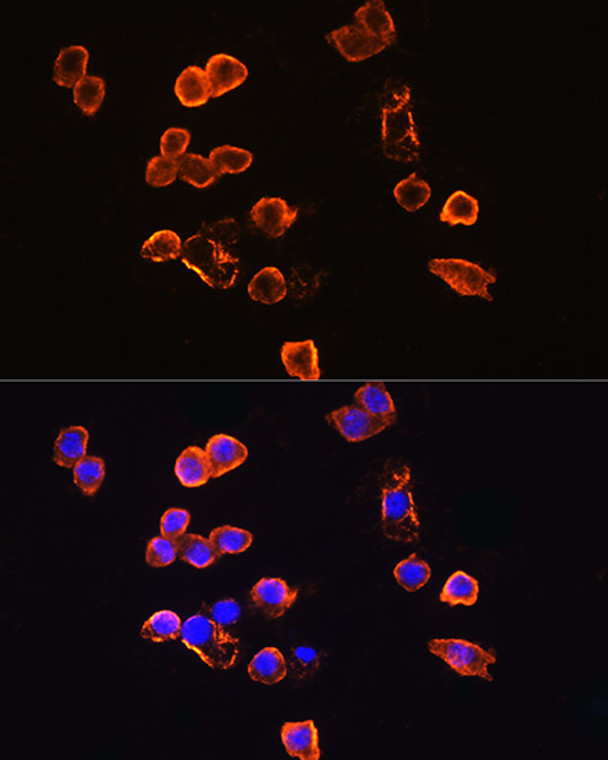| Host: |
Rabbit |
| Applications: |
WB/IF |
| Reactivity: |
Human/Mouse/Rat |
| Note: |
STRICTLY FOR FURTHER SCIENTIFIC RESEARCH USE ONLY (RUO). MUST NOT TO BE USED IN DIAGNOSTIC OR THERAPEUTIC APPLICATIONS. |
| Short Description: |
Rabbit polyclonal antibody anti-CD14 (20-375) is suitable for use in Western Blot and Immunofluorescence research applications. |
| Clonality: |
Polyclonal |
| Conjugation: |
Unconjugated |
| Isotype: |
IgG |
| Formulation: |
PBS with 0.05% Proclin300, 50% Glycerol, pH7.3. |
| Purification: |
Affinity purification |
| Dilution Range: |
WB 1:500-1:1000IF/ICC 1:50-1:200 |
| Storage Instruction: |
Store at-20°C for up to 1 year from the date of receipt, and avoid repeat freeze-thaw cycles. |
| Gene Symbol: |
CD14 |
| Gene ID: |
929 |
| Uniprot ID: |
CD14_HUMAN |
| Immunogen Region: |
20-375 |
| Immunogen: |
Recombinant fusion protein containing a sequence corresponding to amino acids 20-375 of human CD14 (NP_000582.1). |
| Immunogen Sequence: |
TTPEPCELDDEDFRCVCNFS EPQPDWSEAFQCVSAVEVEI HAGGLNLEPFLKRVDADADP RQYADTVKALRVRRLTVGAA QVPAQLLVGALRVLAYSRLK ELTLEDLKITGTMPPLPLEA TGLALSSLRLRNVSWATGRS WLAELQQWLKPGLKVLSIAQ AHSPAFSCEQVRAFPALTSL DLSDNPGLGERGLMAALCPH KFPAIQNLALRNTGMETPTG VCAALAAAGVQPHSLDLSH |
| Tissue Specificity | Detected on macrophages (at protein level). Expressed strongly on the surface of monocytes and weakly on the surface of granulocytes.also expressed by most tissue macrophages. |
| Post Translational Modifications | N- and O- glycosylated. O-glycosylated with a core 1 or possibly core 8 glycan. |
| Function | Coreceptor for bacterial lipopolysaccharide. In concert with LBP, binds to monomeric lipopolysaccharide and delivers it to the LY96/TLR4 complex, thereby mediating the innate immune response to bacterial lipopolysaccharide (LPS). Acts via MyD88, TIRAP and TRAF6, leading to NF-kappa-B activation, cytokine secretion and the inflammatory response. Acts as a coreceptor for TLR2:TLR6 heterodimer in response to diacylated lipopeptides and for TLR2:TLR1 heterodimer in response to triacylated lipopeptides, these clusters trigger signaling from the cell surface and subsequently are targeted to the Golgi in a lipid-raft dependent pathway. Binds electronegative LDL (LDL(-)) and mediates the cytokine release induced by LDL(-). |
| Protein Name | Monocyte Differentiation Antigen Cd14Myeloid Cell-Specific Leucine-Rich GlycoproteinCd Antigen Cd14 Cleaved Into - Monocyte Differentiation Antigen Cd14 - Urinary Form - Monocyte Differentiation Antigen Cd14 - Membrane-Bound Form |
| Database Links | Reactome: R-HSA-1236974Reactome: R-HSA-140534Reactome: R-HSA-166016Reactome: R-HSA-166020Reactome: R-HSA-166058Reactome: R-HSA-166166Reactome: R-HSA-168179Reactome: R-HSA-168188Reactome: R-HSA-2562578Reactome: R-HSA-5602498Reactome: R-HSA-5603041Reactome: R-HSA-5686938Reactome: R-HSA-6798695Reactome: R-HSA-936964Reactome: R-HSA-937041Reactome: R-HSA-937072Reactome: R-HSA-975163 |
| Cellular Localisation | Cell MembraneLipid-AnchorGpi-AnchorSecretedMembrane RaftGolgi ApparatusSecreted Forms May Arise By Cleavage Of The Gpi Anchor |
| Alternative Antibody Names | Anti-Monocyte Differentiation Antigen Cd14 antibodyAnti-Myeloid Cell-Specific Leucine-Rich Glycoprotein antibodyAnti-Cd Antigen Cd14 Cleaved Into - Monocyte Differentiation Antigen Cd14 - Urinary Form - Monocyte Differentiation Antigen Cd14 - Membrane-Bound Form antibodyAnti-CD14 antibody |
Information sourced from Uniprot.org
12 months for antibodies. 6 months for ELISA Kits. Please see website T&Cs for further guidance









